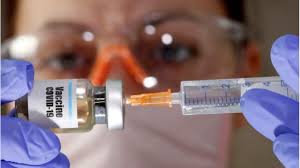NE NEWS SERVICE
AHMEDABAD, DEC 29
As many as 475 “beneficiaries” underwent dummy vaccination at various centres in Gandhinagar and Rajkot districts of Gujarat as the two-day dry run for COVID-19 vaccine programme concluded successfully on Tuesday, said an official.
The dry run, which started on Monday, covered 19 booths set up in Gandhinagar and Rajkot districts as part of the vaccination drive undertaken to assess the preparedness of the authorities ahead of the actual roll-out of the shot.
#IndiaFightsCorona#Unite2FightCorona
Hear from the experts on ‘The Science of Vaccine Development’ on Dec 31, 2020 – 11:00 AM to 1:00 PM IST
Register here: https://t.co/gXxDtsoUfC pic.twitter.com/dNRQvj3Fox
— Ministry of Health (@MoHFW_INDIA) December 29, 2020
No issue was faced with regards to Co-WIN software, developed by the Union Ministry of Health and Family Welfare, logistics for the supply of vaccine and protocol to be followed at the booths selected for the dry run, the official said.
The Co-WIN digital platform has been set up for real-time monitoring of COVID-19 vaccine delivery, recording data and to enable people to get themselves registered for vaccination.
“We have received feedback from all the centres (in Gandhinagar and Rajkot), and everything went off smoothly with no issues faced in the Co-WIN software, logistics, and other aspects related to protocols to be followed at the booths,” said Dr Nayan Jani, State Immunisation Officer.
As many as 475 “beneficiaries” were part of the dry run organised across 19 centres in Gandhinagar and Rajkot, he said.
All these beneficiaries were health workers, who were called for vaccination through SMS sent on their mobile phones with details like their names, time and date for vaccination, Jani said.
He said the discussion with the third party assessor over the dry run was underway for their feedback.
“We can implement the vaccination drive as soon as we receive it (actual shots) as the delivery system is ready and in place,” he said.
The mock vaccination drive started at 9 am on Tuesday with beneficiaries arriving at the booths designated for the purpose as per the details sent to them through SMSes.
At each booth, three rooms were earmarked for the beneficiaries, including the waiting room, and those for vaccination and observation.
The dry run consisted of several steps to get insights about any gaps to be rectified and to check the feasibility of the actual vaccination drive, officials involved in the process said.
These included time taken to dispatch doses to the booths, scrutiny of beneficiary details in Co-WIN, training of vaccinators, as well as storage facilities, among others, the officials said.
Gujarat was one of the four states chosen by the Centre to conduct the two-day dry run for the COVID-19 vaccination programme.
A beneficiary said the process was easy to understand and everything went properly.
“As per the SMS sent to me, I arrived at 9 am. I first went to the waiting room, where my details were verified.
“After I was administered ”vaccine”, I was given a slip with details such as my name, time at which I was administered the shot as well as contact details in case I need to reach out in case of any problem,” said the beneficiary, a woman health worker.
She said after the process, the vaccinator explained her about various aspects like when she is required to come for the second dose and the need to follow COVID-19 protocols like social distancing and face masks strictly.
After that, the beneficiary was asked to stay in another room for observation for nearly half-an-hour.
A representative of the World Health Organisation (WHO), Dr Aniket Rana, said the dry run was a vital process and conducted as per training protocols related to preparedness for the actual vaccination.
“We offered preparedness training, how the software developed for the purpose will work, and operational aspects to see what all hurdles come in the way and how to resolve them to ensure smooth run when the actual vaccine arrives,” he said.
“The biggest challenge is public participation. Even if we are fully prepared, but people’s participation is not proper, the exercise will fail.
“We need to build confidence among people so that they approach us for the vaccination with confidence. Operationally, we are prepared,” Rana said.
The Central government will be informed if any gaps were detected during the dry run, he said.
“This mock drill will help in checking any issues with the software,” Rana said.
For the first phase of the vaccination drive, the State Health Department has identified 4.31 lakh health workers, 6.93 lakh frontline workers, 1.03 crore citizens above the age of 50 and 2.67 lakh citizens under 50 but with severe co-morbidities such as thalassemia (blood disorder) and heart problems.
The state has 2,195 cold chain points at present that can store up to 1 crore doses of a coronavirus vaccine.









